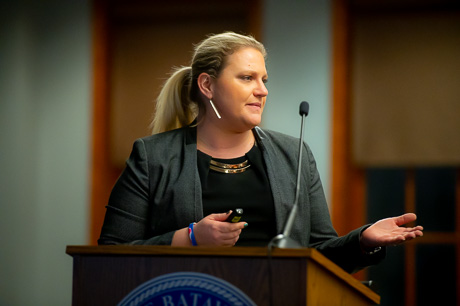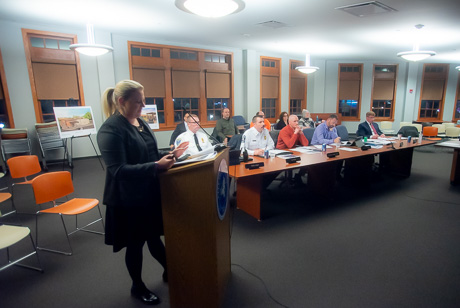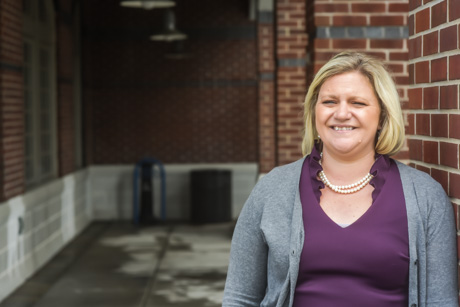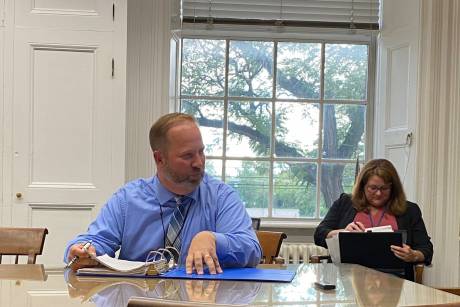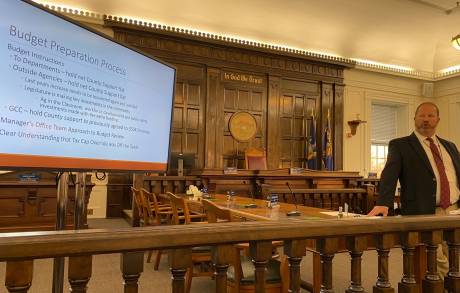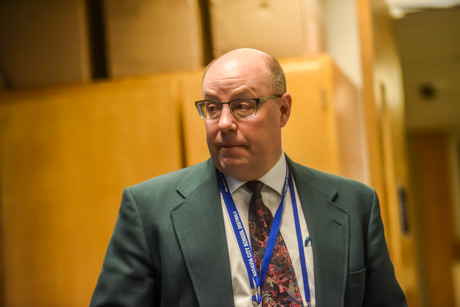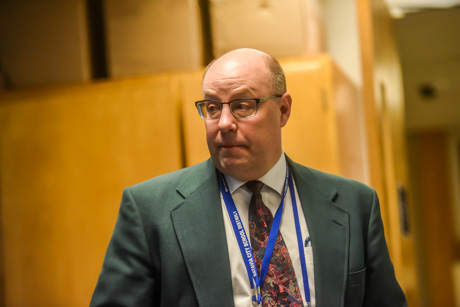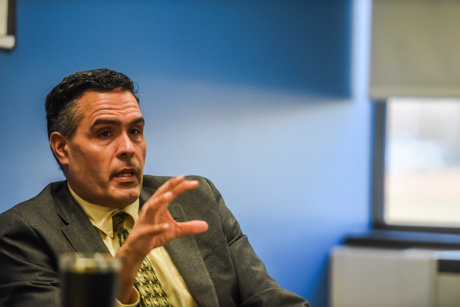Press release:
Governor Andrew M. Cuomo today outlined the FY 2021 Executive Budget, advancing a clear vision and bold, nation-leading and historic actions to make progress happen in the State of New York.
The budget plan features a $33 billion five-year plan to combat climate change, including a new plan to streamline government bureaucracy to deliver renewable energy projects faster; a $25 billion expansion of New York's largest-in-the-nation building program, bringing it to $275 billion; an historic $28.5 billion investment in education while reforming funding formulas to prioritize support for poor schools, and an expanded Excelsior free college tuition program to include families making up to $150,000 per year.
The Executive Budget also includes a new proposal to protect our democracy by banning foreign-influenced corporations from making campaign contributions; the most funding in the state's history - an additional $64 million - to provide services to people who are homeless, including those with mental illness; investments to combat child poverty and $157 million to expand the Empire State Child Tax Credit, serving 400,000 families with children under 4 years old; and an additional $25 million funding to harden security infrastructure at non-public schools and cultural organizations vulnerable to hate crimes.
The budget plan will also promote public health with proposals to ban the sale of flavored e-cigarettes and cap insulin co-payments at $100 per month. It will continue New York's unprecedented economic and social progress by continuing middle-class tax cuts for 4.7 million New Yorkers making under $300,000 a year; cutting small corporate business taxes, benefiting 36,000 taxpayers and saving them $35 million; enacting the strongest Paid Sick Leave program in the nation, impacting 1.3 million New Yorkers; closing the rape intoxication loophole; expanding banking services for low-income people, and proposing an inclusive Equal Rights Amendment.
The Governor's proposal will reform the current Medicaid system with a new Medicaid Redesign Team co-chaired by Michael Dowling of Northwell Health and labor leader Dennis Rivera. The MRT II will work to reform the program and identify $2.5 billion in savings this year by finding industry efficiencies or additional industry revenue with zero impact to beneficiaries.
For the 10th consecutive year, the Executive Budget is balanced and continues the state's record of fiscal integrity.
"This budget is a roadmap for delivering progressive results for the people of this state and addressing the imminent challenges of our time by advancing social, racial and economic justice. We're proposing historic investments in climate change and infrastructure programs and fixing the school aid formula to ensure poorer schools get the funding they need," Governor Cuomo said. "We're tackling the division and hate that has spread like cancer in the body politic by funding new security measures for organizations targeted by hate crimes, protecting our democracy from foreign-influenced corporations, and addressing homelessness, child poverty and other barriers facing low-income New Yorkers. These policies build on our extensive accomplishments over the past nine years that have led to unprecedented economic growth and social progress and historically low unemployment throughout the state all while maintaining fiscal discipline and lowering taxes for middle class families."
Fiscal Highlights of the FY 2021 Executive Budget:
- State Operating Funds spending is $105.8 billion - an increase of 1.9 percent (State Operating Funds exclude Federal funds and capital)
- All Funds spending $178 billion for FY 2021
- Increases School Aid by $826 million - a 3 percent increase that brings the State's total annual investment to $28.5 billion
- Provides $7.8 billion in State support for higher education in New York - an increase of $1.8 billion or 29 percent since FY 2012
- Continues the phase-in of the Middle Class Tax Cut for nearly five million New Yorkers - saving New Yorkers over $1.8 billion this year
2021 MAKING PROGRESS HAPPEN BUDGET HIGHLIGHTS
$33 Billion Five-Year Plan to Combat Climate Change: The FY 2021 Executive Budget continues New York's record as the most aggressive climate leader in the world through a $33 billion five-year plan to combat climate change that will include: $3 billion Restore Mother Nature Bond Act supplemented by $740 million in additional state funding; $28 billion for green energy; and $1.5 billion for carbon-free transportation. The Governor also proposes reforms to approve renewable projects faster, with the State taking the lead in getting sites shovel ready for our green energy future.
$275 Billion Infrastructure Program: Governor Cuomo has undertaken the most ambitious infrastructure plan in the nation. Starting with an initial $100 billion investment, and followed up in the FY 2020 Budget with a second $150 billion investment, this Budget begins the support for expanding the total investment by $25 billion to $275 billion with new investments in transit, roads and bridges. The second phase, newly expanded $175 billion infrastructure plan builds on the Governor's initial $100 billion plan and includes:
- $87 billion for transportation, including mass transit, railroads, airports, highways, bridges, and tunnels across the State.
- $35 billion for improving environmental facilities and parks, and the development of green energy.
- $11 billion for economic and community development.
- $9 billion to further the State's investment in the construction of high-quality, affordable housing for the people of New York.
- $19 billion to help school districts build new and better school buildings.
- $14 billion to improve and maintain SUNY and CUNY buildings, State health care facilities and other capital assets.
The $275 billion infrastructure program will also continue to fund $6 billion for the Long Island Rail Road Second Track, Third Track and 39 modernized stations; new LaGuardia and JFK Airports; the East Side Access project; the Javits Center expansion; four new Bronx Metro-North stations in transit deserts; the Empire State Trail; modernization of the New York State Fair; and the $1 billion New NY Broadband program, ensuring broadband internet access for all.
Housing and Services for People who are Homeless, Including Those with Mental Illness: New York's homeless community and those with mental illness are among the hardest populations to help. This year, Governor Cuomo is proposing an aggressive strategy and the most funding in the State's history to provide housing and services to these vulnerable populations. Building on the State's $20 billion affordable housing and homeless initiative, the FY 2021 Budget doubles funding from $64 million to $128 million for the Homeless Housing Assistance Program and invests $5 million for projects for homeless veterans.
Combating Child Poverty with the Empire State Child Tax Credit: The FY 2021 Budget is supporting $2.9 billion for families with children under five years old, including $157 million to expand the Empire State Child Tax Credit. Currently this critical credit for low-and moderate-income families only applies to children 4-16 years old. This proposal will eliminate this unfair distinction and expand the tax credit to families with children between the ages of 0-3 making under $50,000. This will provide an average of a $400 benefit per family to nearly 400,000 working class families with children under four years old - approximately 172,500 families with children over the age of three will get an additional benefit and 225,500 families with children three and under will receive this benefit for the first time.
Protecting Organizations Vulnerable to Hate Crimes: The FY 2021 Budget will invest an additional $25 million for religious and non-religious not-for-profit organizations that are vulnerable to hate crimes. This funding builds on the $70 million the State has already made available for these organizations to fight back against hate.
Banning Contributions from Foreign-Influenced Corporations: The FY 2021 Budget includes a proposal to ban corporations from contributing to political campaigns in New York, or from making independent expenditures to influence elections, if a single foreign entity controls 5 percent ownership. The proposal would also ban corporations with more than 10 percent ownership in aggregate by two or more foreign entities from making such contributions or expenditures. Finally, the proposal will ban campaign spending if more than 10 percent of a corporation's board members are foreign nationals, or a foreign national participates in the decision making with respect to a corporation's political activities in the United States. Our nation's campaign finance laws state that "foreign nationals" are barred from spending in any American election, city, state or federal. Since that's true for individual foreigners, it must also be true for the corporations owned or controlled by them.
Requiring Public Officials to Disclose Their Tax Returns: Governor Cuomo will propose the "Nothing to Hide" Act in the FY 2021 Executive Budget to make our government the most transparent in the nation. The law will require that the Governor, the Lieutenant Governor, the Attorney General, the Comptroller, every state commissioner, and every Assembly Member and Senator make their tax returns public. Further, any elected official in the State with a government salary over $100,000 a year will have to do the same.
New School Aid Funding Formula: Since 2012, New York State has increased funding for education by 43 percent, and this year the Governor's main goal is to ensure educational equity. In 2019 the Governor mandated that districts disclose the amount of funding distributed to each individual school. However, wealthier school districts still spend approximately $36,000 per student as opposed to $13,000 per student at poorer school districts. To ensure State funds are used to reduce funding disparities, the FY 2021 Budget will increase School Aid by $826 million, bringing the total annual investment to a record $28.5 billion, with 85 percent of the Foundation Aid increase going to the highest-need districts. To further prioritize poorer schools and ensure education equity, the Governor is proposing a new School Aid Funding Formula to properly distribute funds and build up underserved school districts.
Continuing Middle-Class Tax Cuts: Governor Cuomo will continue to lower Personal Income Tax rates for middle-class New Yorkers. In 2020, the third year of the multi-year tax cuts enacted in 2016, income tax rates have been lowered from 6.85 percent to 6.09 percent for taxpayers in the $43,000-$161,550 income bracket, and to 6.41 percent in the $161,550-$323,200 income bracket. These cuts are expected to save 4.7 million New Yorkers over $1.8 billion this year. Furthermore, income tax rates will continue to drop to 5.5 percent for taxpayers in the $27,900-$161,550 tax bracket and 6 percent in the $161,550-$323,200 brackets. When the cuts are fully phased in, middle-class taxpayers will have received an income tax rate cut up to 20 percent, amounting to a projected $4.2 billion in annual savings for six million filers by 2025. As the new rates phase in, they will be the State's lowest middle-class tax rates in more than 70 years.
Lowering Tax Rates by 40 Percent for Small Businesses: To continue the State's robust economic growth and record of job creation, Governor Cuomo will enact comprehensive tax relief for small businesses, including reducing the corporate tax rate for small businesses from 6.5 percent to 4 percent, which will benefit 36,000 taxpayers and save them $35 million.
Establishing Paid Sick Leave for Working New Yorkers: To further empower New York's low-wage workers and protect all consumers in the State, Governor Cuomo will enact paid sick leave. Businesses with five to 99 employees will provide their employees at least five days of job-protected paid sick leave per year and businesses with 100 employees or more will provide at least seven days of paid sick leave per year. Smaller businesses, with four or fewer employees, will guarantee five days of job-protected unpaid sick leave to their employees every year. Small businesses already providing paid sick leave will be able to so.
Expanding Access to Safe and Affordable Banking Services, Credit and Financial Education: The FY 2021 Budget will invest $25 million in new funding over five years to support banking services in low-income areas and underserved communities across the state. This funding is part of the Governor's sweeping financial access and inclusion agenda that builds on the work his administration has done to expand access to safe and affordable banking services, credit and financial education. The Budget will also create a statewide Office of Financial Inclusion and Empowerment, based at the Department of Financial Services, to meet the financial services needs of low- and middle- income New Yorkers across the state.
Expanding Free College Tuition to More Middle-Class Families: To expand the transformational opportunity of the Excelsior Scholarship to more middle-class families, Governor Cuomo is proposing to raise the Excelsior eligibility threshold from $125,000 to $150,000 of adjusted gross family income for New York's families. By increasing the threshold, more than 230,000, or nearly 58 percent of New York resident students will go to a SUNY or CUNY college tuition-free.
Closing the Rape Intoxication Loophole: Governor Cuomo will advance legislation to close the archaic rape intoxication loophole because rape should not be a punishment for drinking alcohol under New York State law. This legislation will rightfully clarify that a victim's ability to consent is jeopardized whether they were voluntarily or involuntarily intoxicated, giving prosecutors the ability to ensure that sexual abusers are held accountable for their criminal acts and sexual abuse survivors are able to obtain the justice they deserve.
Passing First-in-the-Nation Inclusive Equal Rights Amendment: Governor Cuomo will seek to amend the New York State Constitution's Equal Rights Amendment so that New York sets the national standard for how states protect equal rights. The Governor will seek to add sex as a protected class to Section 11 of Article I, ensuring that all New Yorkers, regardless of their gender, are fully protected by the State Constitution. Additionally, he will push for the addition of other categories, including ethnicity, national origin, age, disability, sexual orientation or gender identity so that those critically important protections are also enshrined into the state constitution.
GREEN ECONOMY & ENVIRONMENT
This past decade was the hottest ever recorded, and the five hottest years in history have all occurred since 2015. New York will continue its record as the most aggressive climate leader in the world through a $33 billion five-year plan to combat climate change. This nation-leading first of its kind plan will transition the State to renewable power while combatting climate.
Restore Mother Nature: Centered on the Governor's $3 billion Restore Mother Nature Bond Act, New York State will reduce flood risk, invest in resilient infrastructure and revitalize critical fish and wildlife habitats by connecting streams and waterways, right-sizing culverts and dams, restoring freshwater and tidal wetlands, reclaiming natural floodplains, restocking shellfish populations and upgrading fish hatcheries, preserving open space, conserving more forest areas, replanting more trees, reducing contamination from agricultural and stormwater runoff, and expanding renewable energy. This wide-reaching environmental conservation and resiliency investment includes support from the Department of Environmental Conservation and the Environmental Protection Fund. This is a key component of the Governor's $33 billion five-year plan to combat climate change.
Green Energy: Governor Cuomo has set New York on course to achieving 70 percent of its electricity from renewable sources by 2030, and zero greenhouse gas emissions from the electricity sector by 2040. Under his leadership, the State has made substantial progress toward these goals with significant investments in energy efficiency, solar energy, wind energy and energy storage. To help achieve these goals, the Climate plan invests $28 billion through NYSERDA, New York Green Bank, NYPA and the Regional Greenhouse Gas Initiative to develop, support and expand carbon-free energy production, build the infrastructure such as transmission lines and energy storage that make renewable energy sources viable and work with our regional partners in driving down carbon emissions. This is a key component of the Governor's $33 billion five-year plan to combat climate change.
Carbon-Free Transportation: New York already has the second most efficient transportation sector and lowest CO2 emissions per capita of any state. New York is a leader in electric vehicles - or EVs - thanks to the Charge NY initiative launched by Governor Cuomo in 2013. Charge NY set ambitious goals - 30,000 EVs and 3,000 EV charging stations by the end of 2018 - and exceeded them. Over 50,000 electric vehicles have been purchased in New York since 2013 — more than 48 other states. The Climate Budget invests $370 million to continue to reduce carbon emissions in New York State. This is a key component of the Governor's $33 billion five-year plan to combat climate change.
Banning Single Use and Packaging Styrofoam Products: To build on the progress of last year's plastic bag ban, the Governor is proposing new legislation to prohibit the distribution and use of expanded polystyrene, commonly known as Styrofoam, single-use food containers and packaging materials by January 1, 2022.
Enacting Comprehensive E-Bike and E-Scooter Legislation: To get more people out of cars, the Governor is proposing comprehensive legislation to legalize and expand the e-bike and e-scooter network without compromising on public safety.
Making the Fracking Ban Permanent: The Governor will introduce a bill to permanently ban fracking by amending environmental conservation law to restrict the Department of Environmental Conservation from approving permits that would authorize an applicant to drill, deepen, plug back or convert wells that use high-volume hydraulic fracturing to complete or recomplete natural gas resources, protecting the health of New Yorkers and ensuring permanently that our environment is not harmed by this practice. This bill reflects an important step forward toward achieving New York's clean energy economy goals.
Renewing Record Funding for the Environmental Protection Fund: The Budget continues EPF funding for a second straight year at a record high $300 million. Appropriations include $39 million for solid waste programs, $89 million for parks and recreation, $152 million for open space programs and $20 million for the climate change mitigation and adaptation program.
BUILDING A NEW NY
Economic development follows infrastructure, and while the country sits idle New York State is forging ahead with the nation's most aggressive $275 billion infrastructure program that is transforming every region of the State. Under the Governor's leadership, New York is investing more today in roads and bridges than at any period in our State's history, and the state has already completed $65 billion in construction, more than any state in the nation. Building upon these historic investments, Governor Cuomo will continue to lead the way on creating a 21st Century transportation infrastructure that moves New York's economy forward and improves quality of life for our residents and visitors.
DOT Capital Plan: The FY 2021 Budget will support $11.9 billion for the two-year DOT Capital Plan that will transform New York's highways, bridges, rail, aviation infrastructure, non-MTA transit and DOT facilities. Compared to the final two years of the last DOT Capital Plan, this is an increase of $3 billion, or 33 percent.
MTA Capital Plan Commitment: The FY 2021 Budget will continue to support the $52 billion MTA Capital Plan - the largest state investment in history. This investment includes $3 billion to make up to 70 subway stations accessible.
Upstate Airport Economic Development and Revitalization Competition Round 2: The FY 2021 Budget will invest up to $100 million to continue transforming upstate airports with Round 2 of the Upstate Airport and Economic Development Revitalization Competition. Airports across the state will be encouraged to submit proposals to enhance safety and economic development, improve airport operations and access, reduce environmental impact and create better passenger experiences.
Reimagining the Erie Canal. Building on the findings of the Reimagine the Canal Task Force, the New York Power Authority, which now oversees the Canal Corporation as a subsidiary, will invest $300 million over the next five years to integrate the Empire State Trail and Erie Canal through a new program that will stimulate tourism and economic development, address environmental challenges unknown a century ago, and create an asset that will improve the quality of life in communities along the 360-mile spine of the Erie Canal. A first phase of funding will start this year that will have two parts: a $100 million economic development fund to invest in communities along the Canal and a separate $65 million investment in solutions that will help prevent ice jams and related flooding in the Schenectady area. The remaining $135 million of the plan's funding will subsequently be allocated to research recommended by the Reimagine Task Force, as well as to solutions related to flood mitigation, invasive species prevention and ecosystem restoration.
Empire Station: The State is investing $700 million to leverage a total of $3 billion, including from private sector and Federal sources, for the transformation of the James A. Farley Post Office building into the Moynihan Train Hall. Combined with extensive renovations at the existing Penn Station, this will create a new Empire Station. In his 2020 State of the State, Governor Cuomo announced a proposal to expand Penn Station southward to create the Empire Station District. The plan creates new, larger terminals, and will increase track and train capacity by 40 percent, addressing the underlying and most critical problem at the busiest transit hub in the Western Hemisphere.
Regional Targeted Investments are Working
The Governor will continue to advance economic prosperity for all with projects that build on the state's successful regional economic development strategy.
Securing a High-Speed Electron-Ion Collider at Brookhaven: The FY 2021 Budget supports a $100 million multi-year commitment to secure a High-Speed Electron-Ion Collider at Brookhaven to build the region's research triangle. The funding will allow for the construction of new support buildings, power distribution upgrades, a new cooling system and sustainability enhancements required for the new collider.
Modernizing Lake Placid Olympic facilities, Gore and Belleayre Mountains: The FY 2021 Budget will invest $147 million to modernize Lake Placid Olympic Facilities, Gore Mountain, and Belleayre Mountain.
Creating the State's First Comprehensive Education and Training Center in Syracuse: To meet the emerging science, technology, engineering, arts, and mathematics demands in Syracuse, the Executive Budget proposes the creation of the State's first regional Comprehensive Education and Workforce Training Center in Central New York. Administered by the Syracuse City School District in partnership with SUNY Empire State College and other local colleges and universities, the Center will provide specialized educational opportunities and state of the art workforce training programs in advanced technologies to students and residents throughout the region. The State will reimburse 98 percent, or $71.4 million, of the cost to renovate the building that will house the Center. The Syracuse Comprehensive Education and Workforce Training Center is scheduled to open in 2021 and will serve ultimately 1,000 students, as well as residents of the community.
Transforming Buffalo's North Aud Block: The State will develop Buffalo Canalside's North Aud Block and improve access to the city's waterfront, featuring mixed use residential and commercial buildings and a piazza for public use, based on community and stakeholder input. This also includes the rail station that is forthcoming in Buffalo and its coordination with the new North Aud Block neighborhood.
Expanding High Technology Companies in Rochester: The Governor is supporting the expansion of three industry-leading high technology companies in the City of Rochester that will further grow the Finger Lakes regional economy as part of the Governor's continued commitment to growing the high-tech ecosystem in and around Rochester's Downtown Innovation Zone. The expansion of these companies will create more than 700 jobs in and near Rochester's Downtown Innovation Zone.
Expanding New York's Drone Corridor: The Governor is investing $9 million to establish an unmanned aerial system experimentation and test facility at Griffiss International Airport in Rome, Oneida County. This "Skydome" will be a year-round indoor research facility to support the safe experimentation of drone technology and techniques, further strengthening the Mohawk Valley and Central New York as a hub for innovation.
Phase II Capitol Courtyard Restoration: The FY 2021 Executive Budget will invest $5 million to enhance the State Capitol by renovating and refurbishing the courtyard to bring it back to its original grandeur and make it sustainable for commercial use.
Transferring Pier 76 Tow Pound to Hudson River Park for Reuse: Governor Cuomo is proposing that the Hudson River Park Trust develop a plan to effectuate the long deferred transfer of Pier 76 from its use as a tow pound for the NYPD to the control of the Hudson River Park Trust to integrate into the park complex, maximizing green space, recreation and community access and market potential. As part of the proposal, the NYPD must vacate within one year and the Hudson River Park Trust should also develop an improvement plan for Pier 40.
Vital Brooklyn Initiative: The FY 2021 Executive Budget will continue to invest in the $1.4 billion Vital Brooklyn Initiative. The funding will help build 32 healthcare centers, 4,000 new affordable homes and over 400 acres of newly opened green and recreational space.
South Bronx Transformation: The Budget will support $1.8 billion for the South Bronx transformation - the largest state investment in the South Bronx in the State's history. Projects to transform the South Bronx include the Sheridan Boulevard, Hunts Point Market and four new Metro-North stations in Bronx transit deserts.
Launching Next Round of the Downtown Revitalization Initiative: The Downtown Revitalization Initiative is transforming downtown neighborhoods into vibrant communities where the next generation of New Yorkers will want to live, work and raise families. Participating communities are nominated by the State's ten REDCs based on the downtown's potential for transformation. Through four rounds of awards, each winning community was awarded $10 million to develop a downtown strategic investment plan and implement key catalytic projects that advance the community's vision for revitalization. The FY 2021 Executive Budget provides $100 million for a fifth round of the Downtown Revitalization Program.
Continuing the Successful Regional Economic Development Councils: In 2011, Governor Cuomo established 10 Regional Economic Development Councils to develop long-term regional strategic economic development plans. Since then, the State has invested more than $6.9 billion through the REDCs, funding more than 8,300 projects and supporting more than 240,000 jobs across the state. The FY 2021 Executive Budget includes $750 million to continue our aggressive, bottom-up regional economic development strategy through the transformative REDC initiative.
COMBATING DIVISION AND ENSURING PUBLIC SAFETY
Increasing and Modernizing Emergency Response Capacity: Over 60 percent of New York counties have been flooded twice in the past 10 years. We must be ready to handle these increasing, life-threatening, emergency situations. It is a new and growing challenge for our state operations. The FY 2021 Executive Budget sustains $12 million in capital funding to increase and update the State's emergency response capacity so our brave women and men have the right equipment to do their jobs.
Banning Repeat and High-Risk Sexual Offenders from MTA Transit Systems: The Governor will advance legislation to authorize the MTA to issue orders prohibiting individuals who commit repeat sex-related violations of the MTA code of conduct, those who are high-risk sex offenders (Level 3) or those who assault or harass MTA employees from using MTA transportation services for a period of three years. Additionally, this proposal will establish a new law for transit-related sex crime where, if convicted, a prohibition order may be imposed by a judge to ensure the safety of the pubic. Under this proposal, as a condition of pre-trial release, the judge may also issue a temporary prohibition order if good cause is shown that the prohibition is necessary to maintain public safety. Individuals who violate a prohibition order could be charged with Transit Trespass, an A misdemeanor.
Banning Fentanyl Analogs to Further Combat the Opioid Epidemic: The Governor will introduce legislation to explicitly designate fentanyl analogs as controlled substances in New York State. This legislation will give police and law enforcement the authority to prosecute the manufacturing, sale and distribution of these drugs to the fullest extent of the law. The proposed legislation will also give the State Department of Health Commissioner the authority to add additional analogs to the list of controlled substances, enabling the State to stay in front of these deadly substances as they appear on the market.
Preventing the Manufacture and Dissemination of Ghost Guns: To address the growing concern over ghost guns, Governor Cuomo will advance comprehensive legislation to prevent access to and use of these weapons. First, this proposal would require individuals to obtain major components of a firearm, rifle or shotgun only through an in-store transaction at a licensed gun dealer. Second, licensed dealers would be required to distribute major components only to individuals who possess valid identification and to log all transactions and would require all unfinished frames and receivers to have a serial number issued by the State Police. Third, the proposal would prohibit individuals who cannot legally possess a rifle or shotgun from possessing a major component part that could be used to build a firearm, rifle or shotgun and create new misdemeanor and felony penalties for violating these new provisions.
Closing the Out-of-State Gun Loophole: Governor Cuomo will advance legislation to prohibit individuals from obtaining a gun license who commit serious offenses out-of-state that would disqualify them from obtaining a gun license if committed in New York. This will provide greater consistency in New York's licensing scheme and ensure individuals who are prohibited from purchasing a firearm are not able to do so. The Governor is also advancing legislation to require all state and local law enforcement agencies in the state to opt in to the ATF's crime gun trace data sharing program and submit crime guns recovered through the ATF's eTrace system. Additionally, Governor Cuomo is proposing legislation to amend the Mental Hygiene Law to allow New York to share reports of individuals who are a danger to themselves or others with other states.
Legalizing Cannabis: This year Governor Cuomo is proposing a comprehensive regulatory approach to legalize cannabis, creating a new Office of Cannabis Management to specialize in cannabis regulation - overseeing the medical, adult-use and hemp programs. The proposal will administer social equity licensing opportunities, develop an egalitarian adult-use market structure and facilitate market entry through access to capital, technical assistance and incubation of equity entrepreneurs. The proposal will also correct past harms to individuals and communities that have disproportionally been impacted by prohibition. To safeguard public health, the proposal limits the sale of cannabis products to adults 21 and over and establishes stringent quality and safety controls including oversight over the packaging, labeling, advertising and testing of all cannabis products. These efforts will be done in coordination with neighboring states Connecticut, New Jersey and Pennsylvania. The Governor will also propose creating a first of its kind Global Cannabis and Hemp Center for Science, Research and Education with SUNY and other expert partners.
Passing the Hate Crime Anti-Terrorism Act: To address the disturbing number of anti-Semitic and other discriminatory attacks in New York, the Governor is proposing a first-in-the-nation domestic terrorism law to include mass violence motivated by hate, creating a new A-1 class felony punishable by up to life in prison without parole. The Governor is also proposing New York schools add a curriculum that teaches civic values and the state's rich history of diversity and religious freedom. The Battery Park City Authority will develop a plan to expand the Museum of Jewish Heritage on the Holocaust to be a learning destination for school children across the state.
